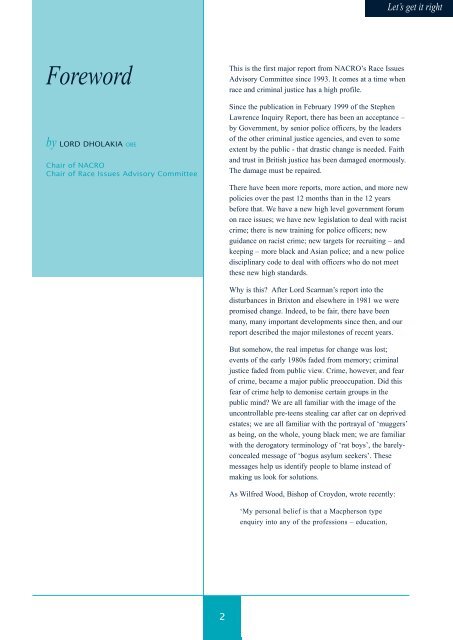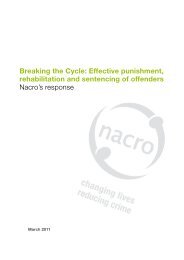Let's get it right: race and justice 2000 - Nacro
Let's get it right: race and justice 2000 - Nacro
Let's get it right: race and justice 2000 - Nacro
- No tags were found...
You also want an ePaper? Increase the reach of your titles
YUMPU automatically turns print PDFs into web optimized ePapers that Google loves.
Let’s <strong>get</strong> <strong>it</strong> <strong>right</strong>Forewordby LORD DHOLAKIA OBEChair of NACROChair of Race Issues Advisory Comm<strong>it</strong>teeThis is the first major report from NACRO’s Race IssuesAdvisory Comm<strong>it</strong>tee since 1993. It comes at a time when<strong>race</strong> <strong>and</strong> criminal <strong>justice</strong> has a high profile.Since the publication in February 1999 of the StephenLawrence Inquiry Report, there has been an acceptance –by Government, by senior police officers, by the leadersof the other criminal <strong>justice</strong> agencies, <strong>and</strong> even to someextent by the public - that drastic change is needed. Fa<strong>it</strong>h<strong>and</strong> trust in Br<strong>it</strong>ish <strong>justice</strong> has been damaged enormously.The damage must be repaired.There have been more reports, more action, <strong>and</strong> more newpolicies over the past 12 months than in the 12 yearsbefore that. We have a new high level government forumon <strong>race</strong> issues; we have new legislation to deal w<strong>it</strong>h racistcrime; there is new training for police officers; newguidance on racist crime; new tar<strong>get</strong>s for recru<strong>it</strong>ing – <strong>and</strong>keeping – more black <strong>and</strong> Asian police; <strong>and</strong> a new policedisciplinary code to deal w<strong>it</strong>h officers who do not meetthese new high st<strong>and</strong>ards.Why is this? After Lord Scarman’s report into thedisturbances in Brixton <strong>and</strong> elsewhere in 1981 we werepromised change. Indeed, to be fair, there have beenmany, many important developments since then, <strong>and</strong> ourreport described the major milestones of recent years.But somehow, the real impetus for change was lost;events of the early 1980s faded from memory; criminal<strong>justice</strong> faded from public view. Crime, however, <strong>and</strong> fearof crime, became a major public preoccupation. Did thisfear of crime help to demonise certain groups in thepublic mind? We are all familiar w<strong>it</strong>h the image of theuncontrollable pre-teens stealing car after car on deprivedestates; we are all familiar w<strong>it</strong>h the portrayal of ‘muggers’as being, on the whole, young black men; we are familiarw<strong>it</strong>h the derogatory terminology of ‘rat boys’, the barelyconcealedmessage of ‘bogus asylum seekers’. Thesemessages help us identify people to blame instead ofmaking us look for solutions.As Wilfred Wood, Bishop of Croydon, wrote recently:‘My personal belief is that a Macpherson typeenquiry into any of the professions – education,2

















